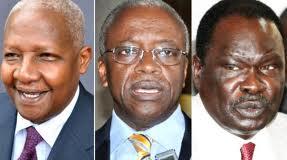Uganda Oil: Global watchdog raises concerns
By George Murumba
5th March 2012:
Global Witness, an international watchdog that is known for tackling “the underlying causes of conflict and poverty” has raised five key concerns about Uganda’s existing legislative and administrative framework for managing the oil sector.
In a report released February 28, and titled “Uganda’s Petroleum Legislation: Safeguarding the Sector”, Global Witness said the new oil sector management Bills that are before parliament “…will need to be carefully considered and substantive amendments made if it is to meet international best practice and provide a solid foundation for Uganda’s petroleum sector.”
In particular, the watchdog said that many of the concerns raised in response to the last draft Bill in May 2010 have not been addressed in the new Bills. “…Tight ministerial control, absence of parliamentary oversight and a lack of guarantees on contract and financial transparency remain key features of both Bills.” Global Witness said.
In order to remedy the situation, Global Witness offered what it called “the top five Global Witness recommendations”. In the first instance, Global Witness urges the government to “reduce direct Ministerial discretionary control of the sector” by:
- Strengthening the independence of, and better defining, institutions and their roles.
- Leaving less to secondary regulations and contracts, and ministerial discretion.
- Clarifying what kind of system the GoU will use for partnering with international companies and provide further information about this process.
Secondly, Global Witness also urged the government to “…provide a strong role for Parliament in the management of the petroleum sector by giving them the explicit power in the legislation to approve new acreage, regulations, licences and contracts and play a greater oversight role.” It also advised the government to consider other oversight bodies.
Thirdly, the global watchdog also advised the government to “…commit to making all documents relating to the petroleum sector public unless they fall within tightly and specifically defined exemptions.” The group’s fourth recommendation is that the government commits “…to financial transparency in the management of petroleum revenues and bidding processes. Present revenue management legislation to be considered alongside these two Bills, before passing them into law.”
Finally, Global Witness urged the government of Uganda to “…commit to, and set out a process for, careful consultation with all relevant stakeholders at each stage of petroleum development.” This, the watchdog said, could include licence allocation and renewal, drawing on the free, prior and informed consent model of best practice.
But it was not all doom and gloom for Uganda’s nascent and already controversial oil industry. The above concerns notwithstanding, Global Witness also made it clear that it welcomes the introduction of the Bills and congratulates the government of Uganda on its efforts to bring in sound legislation to govern the industry.
The government recently introduced two petroleum Bills to parliament. Every clause in the two Bills is potentially crucial for the future management of the country’s petroleum assets. The Bills will for example set the parameters for how the country’s oil sector will be governed – covering the allocation process, transportation, refinement and how revenues from the sale of oil will be managed.
Uganda’s newly discover oil reserves are said to have the potential of earning the country up to US$2.4bn per year. END. Please login to www.ugandacorrespondent.com every Monday to read our top stories and anytime mid-week for our news updates.
![]()


